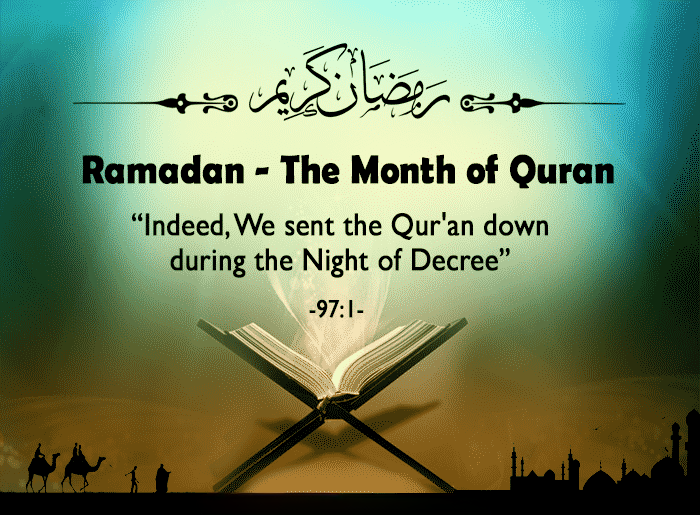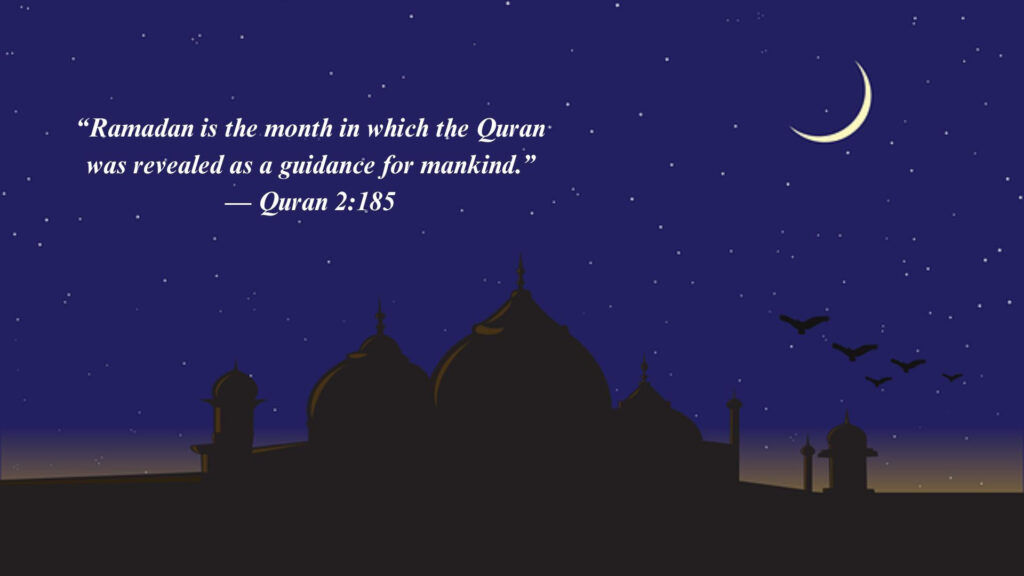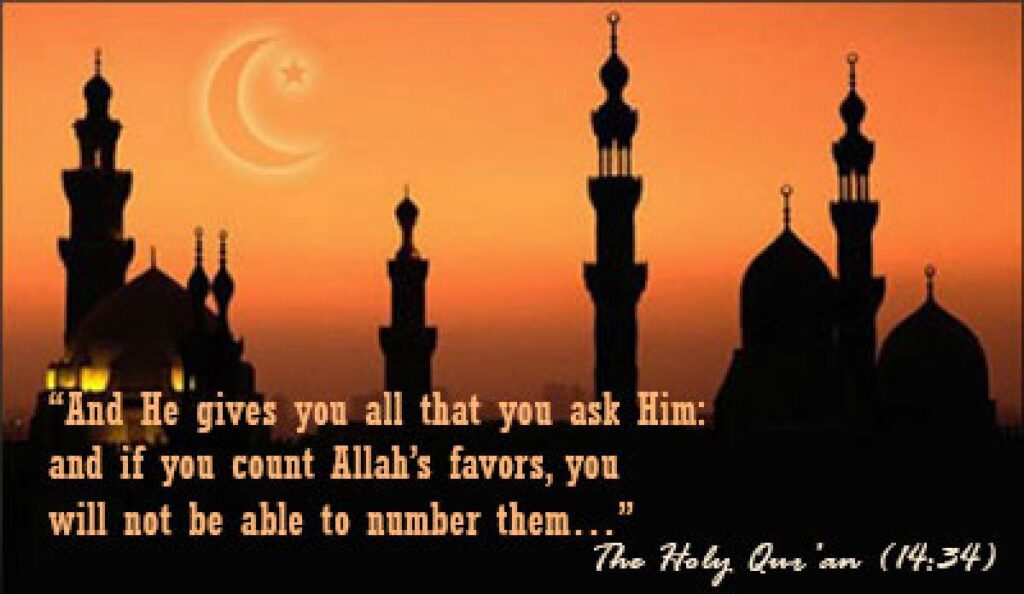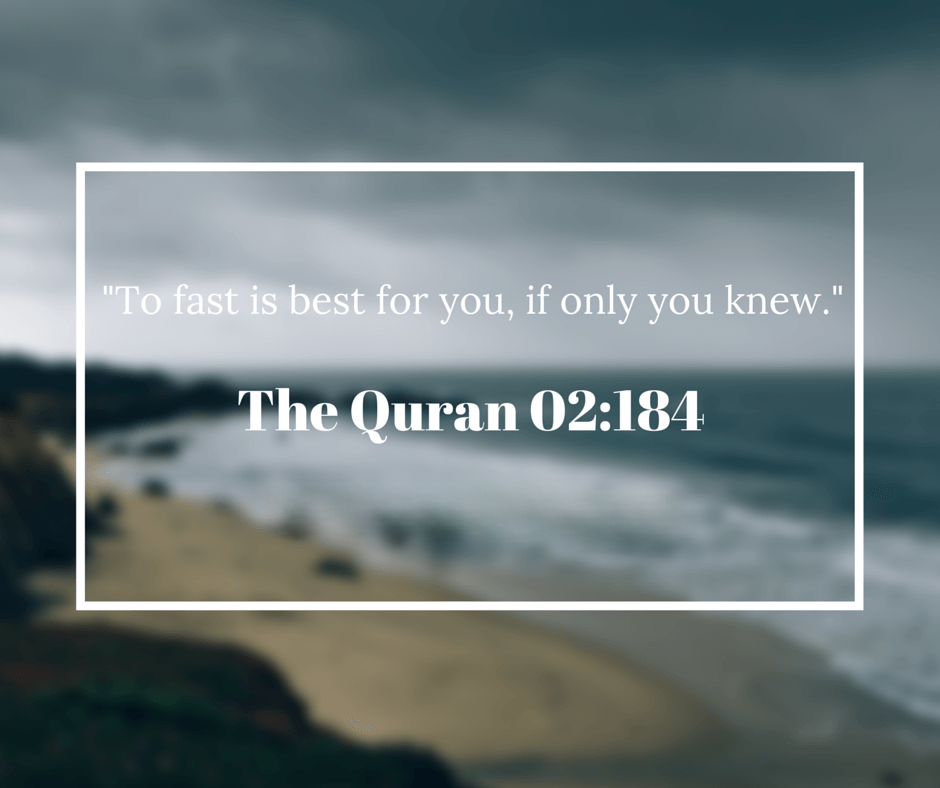“Ramadan, the holiest month in Islam, holds profound significance for millions of Muslims worldwide. It is a time of spiritual reflection, fasting, prayer, and community. Central to the observance of Ramadan are the teachings found in the Holy Quran, which offer guidance, solace, and inspiration. In this article, we delve into some poignant Ramadan quotes from the Quran, exploring their meanings and relevance to the lives of believers.”
Table of Contents
The Importance of Ramadan in Islam
“Ramadan holds immense significance in Islam, serving as a sacred period of spiritual rejuvenation, reflection, and self-discipline for Muslims worldwide. This holiest month of the Islamic lunar calendar commemorates the revelation of the Quran to Prophet Muhammad (peace be upon him) and marks a time of heightened devotion and connection with Allah. Through fasting from dawn until sunset, Muslims strive to attain greater piety, self-control, and empathy for those less fortunate. Ramadan also fosters a sense of communal solidarity as families and communities come together for special prayers, shared meals (iftar), and acts of charity (zakat). Beyond its rituals, Ramadan underscores the values of compassion, gratitude, and self-improvement, guiding believers towards a deeper understanding of their faith and a stronger connection to Allah.”
Quranic Verses on Ramadan
Surah Al-Baqarah (2:183): “O you who have believed, decreed upon you is fasting as it was decreed upon those before you that you may become righteous.”
Surah Al-Baqarah (2:185): “The month of Ramadan [is that] in which was revealed the Quran, a guidance for the people and clear proofs of guidance and criterion. So whoever sights [the new moon of] the month, let him fast it; and whoever is ill or on a journey – then an equal number of days [are to be made up]. Allah intends for you ease and does not intend for you hardship and [wants] for you to complete the period and to glorify Allah for that [to] which He has guided you, and perhaps you will be grateful.”
Surah Al-Baqarah (2:187): “It has been made permissible for you the night preceding fasting to go to your wives [for sexual relations]. They are clothing for you and you are clothing for them. Allah knows that you used to deceive yourselves, so He accepted your repentance and forgave you. So now, have relations with them and seek that which Allah has decreed for you. And eat and drink until the white thread of dawn becomes distinct to you from the black thread [of night]. Then complete the fast until the sunset. And do not have relations with them as long as you are staying for worship in the mosques. These are the limits [set by] Allah, so do not approach them. Thus does Allah make clear His ordinances to the people that they may become righteous.”
Also See:230+ Ramadan Status, Captions and Messages
Surah Al-A’raf (7:31): “O children of Adam, take your adornment at every masjid, and eat and drink, but be not excessive. Indeed, He likes not those who commit excess.”
Surah Al-Qadr (97:1-5): “Indeed, We sent the Quran down during the Night of Decree. And what can make you know what is the Night of Decree? The Night of Decree is better than a thousand months. The angels and the Spirit descend therein by permission of their Lord for every matter. Peace it is until the emergence of dawn.”
Surah Al-Baqarah (2:196): “And complete the Hajj and Umrah for Allah. But if you are prevented, then [offer] what can be obtained with ease of sacrificial animals. And do not shave your heads until the sacrificial animal has reached its place of slaughter. And whoever among you is ill or has an ailment of the head [making shaving necessary must offer] a ransom of fasting [three days] or charity or sacrifice. And when you are secure, then whoever performs ‘umrah [during the Hajj months] followed by Hajj [offers] what can be obtained with ease of sacrificial animals. And whoever cannot find [or afford such an animal] – then a fast of three days during Hajj and of seven when you have returned [home]. Those are ten complete [days]. This is for those whose family is not in the area of al-Masjid al-Haram. And fear Allah and know that Allah is severe in penalty.”
Surah Al-Baqarah (2:197): “Hajj is [during] well-known months, so whoever has made Hajj obligatory upon himself therein [by entering the state of ihram], there is [to be for him] no sexual relations and no disobedience and no disputing during Hajj. And whatever good you do – Allah knows it. And take provisions, but indeed, the best provision is fear of Allah. And fear Me, O you of understanding.”
Surah Al-Baqarah (2:198): “There is no blame upon you for seeking bounty from your Lord [during Hajj]. But when you depart from ‘Arafat, remember Allah at al- Mash’ar al-Haram. And remember Him, as He has guided you, for indeed, you were before that among those astray.”
Surah Al-Baqarah (2:199): “Then depart from the place from where [all] the people depart and ask forgiveness of Allah. Indeed, Allah is Forgiving and Merciful.”
Surah Al-Baqarah (2:200): “And when you have completed your rites, remember Allah like your [previous] remembrance of your fathers or with [much] greater remembrance. And among the people is he who says, ‘Our Lord, give us in this world,’ and he will have in the Hereafter no share.”
Surah Al-Baqarah (2:201): “But among them is he who says, ‘Our Lord, give us in this world [that which is] good and in the Hereafter [that which is] good and protect us from the punishment of the Fire.'”
Surah Al-Baqarah (2:202): “Those will have a share of what they have earned, and Allah is swift in account.”
Surah Al-Baqarah (2:203): “And remember Allah during [specific] numbered days. Then whoever hastens [his departure] in two days – there is no sin upon him; and whoever delays [until the third] – there is no sin upon him – for him who fears Allah. And fear Allah and know that unto Him you will be gathered.”
Surah Al-Baqarah (2:204): “And of the people is he whose speech pleases you in worldly life, and he calls Allah to witness as to what is in his heart, yet he is the fiercest of opponents.”
Surah Al-Baqarah (2:205): “And when he goes away, he strives throughout the land to cause corruption therein and destroy crops and animals. And Allah does not like corruption.”
Reflecting on the Spiritual Significance
Reflecting on the spiritual significance of Ramadan unveils a journey of self-discovery and devotion deeply rooted in the teachings of Islam. This sacred month serves as a period of heightened spiritual awareness, inviting Muslims to delve into introspection, repentance, and a profound connection with Allah.
At its core, Ramadan embodies the values of self-discipline and restraint. Through abstaining from food, drink, and worldly distractions from dawn until sunset, believers learn to cultivate patience, resilience, and gratitude. Fasting becomes more than a physical act; it becomes a means of purifying the soul, cleansing it from impurities, and fostering a deeper sense of empathy for the less fortunate.
Moreover, Ramadan offers an opportunity for sincere reflection on one’s actions, intentions, and relationship with the Divine. Muslims engage in increased acts of worship, including recitation of the Quran, prayer, and supplication, seeking guidance and spiritual nourishment. The nights of Ramadan are particularly revered, with special prayers such as Taraweeh providing moments of intimate communion with Allah.
Through communal gatherings for iftar (breaking the fast) and suhoor (pre-dawn meal), Ramadan fosters a sense of unity and solidarity among believers. Families and communities come together to share blessings, support one another in their spiritual endeavors, and extend acts of kindness and charity to those in need.
Ultimately, Ramadan serves as a reminder of the transformative power of faith and the boundless mercy of Allah. It is a time to seek forgiveness, renewal, and spiritual growth, paving the way for a deeper connection with the Divine and a renewed commitment to living a life of righteousness and compassion.
Ramadan Quotes for Reflection and Inspiration
“O you who have believed, decreed upon you is fasting as it was decreed upon those before you that you may become righteous.” – Quran, Surah Al-Baqarah (2:183)
“The month of Ramadan [is that] in which was revealed the Quran, a guidance for the people and clear proofs of guidance and criterion.” – Quran, Surah Al-Baqarah (2:185)
“The fast and the Quran are two intercessors for the servant of Allah on the Day of Resurrection. The fast will say: ‘O Lord, I prevented him from his food and desires during the day. Let me intercede for him.’ The Quran will say: ‘I prevented him from sleeping at night. Let me intercede for him.’ And their intercession will be accepted.” – Prophet Muhammad (peace be upon him)
“Whoever establishes prayers during the nights of Ramadan faithfully out of sincere faith and hoping to attain Allah’s rewards (not for showing off), all his past sins will be forgiven.” – Prophet Muhammad (peace be upon him)
“When Ramadan enters, the gates of Paradise are opened, the gates of Hellfire are closed, and the devils are chained.” – Prophet Muhammad (peace be upon him)
“Fasting is a shield with which a servant protects himself from the fire.” – Prophet Muhammad (peace be upon him)
“A generous man is near Allah, near paradise, near men, and far from hell, and a stingy man is far from Allah, far from paradise, far from men, and near hell. And an ignorant man who is generous is dearer to Allah than a worshipper who is stingy.” – Prophet Muhammad (peace be upon him)
“When one of you is fasting, he should abstain from indecent acts and unnecessary talk, and if someone begins an obscene conversation or tries to pick an argument, he should simply tell him, ‘I am fasting.'” – Prophet Muhammad (peace be upon him)
“He who gives iftar to another fasting person shall earn reward equivalent to a fasting man without detracting from the reward of the latter.” – Prophet Muhammad (peace be upon him)
“There are in the month of Ramadan in every day and night those to whom Allah grants freedom from the Fire, and there is for every Muslim a supplication which he can make and will be granted.” – Prophet Muhammad (peace be upon him)
“The best charity is that given in Ramadan.” – Prophet Muhammad (peace be upon him)
“Whoever draws nearer (to Allah) by performing any of the (optional) good deeds in (this month) shall receive the same reward as performing an obligatory deed at any other time.” – Prophet Muhammad (peace be upon him)
“Make this Ramadan the turning point in your life. Break free from the deceptions of this world and indulge in the sweetness of Eeman.” – Mufti Ismail Menk
“Fasting is a shield, it will protect you from the hellfire and prevent you from sins.” – Unknown
“Ramadan is the month to fast, pray, reflect, and become a better person.” – Unknown
“Every fast is a struggle, but every struggle is worth it when it’s for the sake of Allah.” – Unknown
“Use Ramadan as a chance to purify your heart and soul.” – Unknown
“Ramadan is not just about abstaining from food and drink, it’s about purifying the soul.” – Unknown
“The month of Ramadan is here, a time to purify the soul and cleanse the mind.” – Unknown
“Ramadan is a time to detach from worldly pleasures and focus on one’s inner self.” – Unknown
Applying Quranic Teachings During Ramadan
During Ramadan, Muslims strive to apply Quranic teachings in their daily lives, seeking to deepen their spiritual connection with Allah and embody the principles outlined in the Holy Quran. Here are several ways in which believers apply Quranic teachings during this sacred month:
- Fasting with sincerity and devotion: Muslims fast during Ramadan as an act of obedience to Allah’s commandment, as stated in the Quran (Surah Al-Baqarah, 2:183). Fasting encourages self-discipline, self-control, and empathy for the less fortunate, aligning with the Quranic injunctions to seek righteousness and piety.
- Increased recitation and reflection on the Quran: Ramadan is a time when Muslims devote themselves to the recitation and contemplation of the Quran. The Quranic verses provide guidance, inspiration, and solace, serving as a source of spiritual nourishment during the fast. Believers aim to deepen their understanding of Allah’s message and incorporate its teachings into their lives.
- Practicing patience and forbearance: The Quran emphasizes the importance of patience in numerous verses, particularly during challenging times. Muslims apply this teaching during Ramadan by exercising patience while fasting, refraining from anger and negative behavior, and enduring hardships with resilience and trust in Allah’s wisdom.
- Engaging in acts of charity and kindness: Ramadan is a time for increased generosity and compassion towards others, reflecting the Quranic emphasis on charity and goodwill. Muslims are encouraged to give generously to those in need, feed the hungry, and support charitable causes, embodying the Quranic principle of sharing blessings with others (Surah Al-Baqarah, 2:267).
- Seeking forgiveness and repentance: The Quran teaches the importance of seeking forgiveness for one’s sins and repenting sincerely to Allah. During Ramadan, Muslims engage in intensified acts of worship, seeking Allah’s mercy and forgiveness through prayers, supplications, and reflection on their actions. This practice aligns with the Quranic promise of Allah’s forgiveness for those who turn to Him in repentance (Surah Az-Zumar, 39:53).
- Striving for self-improvement: Ramadan serves as an opportunity for Muslims to engage in introspection and self-reflection, identifying areas for personal growth and moral development. Believers aim to overcome their shortcomings, cultivate positive habits, and strengthen their commitment to living according to Quranic values of righteousness, justice, and compassion.
By applying Quranic teachings during Ramadan, Muslims seek to deepen their spiritual connection with Allah, purify their hearts, and emerge from the month with renewed faith, inner peace, and a strengthened sense of purpose in serving Allah and humanity.
Connecting with the Divine Through Ramadan
Ramadan serves as a sacred opportunity for Muslims to deepen their connection with the Divine, fostering a profound spiritual journey marked by devotion, reflection, and worship. Here’s how believers connect with Allah during this blessed month:
- Intensified Prayer and Worship: Muslims engage in increased acts of worship during Ramadan, including the five daily prayers, Taraweeh prayers (special nightly prayers), and additional supplications. Through these rituals, believers seek closeness to Allah, expressing gratitude, seeking guidance, and seeking forgiveness for their sins.
- Recitation and Reflection on the Quran: Ramadan is a time for extensive recitation and contemplation of the Quran, the sacred scripture of Islam. Muslims aim to deepen their understanding of Allah’s message, derive spiritual insights, and strengthen their bond with Allah through the recitation of His words. Reflecting on the Quranic verses helps believers draw closer to Allah and align their lives with His teachings.
- Fasting as Spiritual Discipline: Fasting during Ramadan is a fundamental practice that enhances spiritual awareness and fosters a sense of closeness to Allah. By abstaining from food, drink, and other worldly desires from dawn until sunset, Muslims cultivate self-discipline, self-control, and mindfulness. Fasting serves as a means of purifying the soul, elevating one’s spiritual consciousness, and strengthening the bond between the believer and Allah.
- Seeking Forgiveness and Mercy: Ramadan is a time of seeking Allah’s forgiveness and mercy, as emphasized in the teachings of Islam. Believers engage in heartfelt prayers, repentance, and acts of charity, recognizing their shortcomings and seeking Allah’s pardon for their sins. The month of Ramadan is viewed as an opportunity for spiritual renewal, purification, and redemption, as believers strive to draw closer to Allah and attain His mercy.
- Charity and Compassion: Ramadan inspires acts of kindness, generosity, and compassion towards others, reflecting Allah’s attributes of mercy and benevolence. Muslims are encouraged to give generously to those in need, feed the hungry, and support charitable causes during this blessed month. By demonstrating compassion and generosity, believers strengthen their connection with the Divine and fulfill their duty to serve humanity as enjoined by Islam.
- Community and Brotherhood: Ramadan fosters a sense of unity and brotherhood among Muslims, as believers come together to observe fasting, prayers, and other religious rituals. The communal spirit of Ramadan reinforces the importance of solidarity, cooperation, and mutual support within the Muslim community. Through collective worship and shared experiences, believers strengthen their bonds with one another and with Allah, experiencing the blessings of unity and fellowship.
Overall, Ramadan serves as a transformative journey of spiritual growth and enlightenment, providing believers with a unique opportunity to deepen their connection with the Divine, purify their souls, and renew their commitment to living a life of faith, righteousness, and devotion. Through prayer, fasting, reflection, and acts of compassion, Muslims strive to draw closer to Allah and experience the profound blessings and guidance of this sacred month.
Conclusion:
In conclusion, Ramadan stands as a sacred and transformative month for Muslims worldwide. Through fasting, prayer, reflection, and acts of charity, believers deepen their connection with Allah and strengthen their commitment to living according to the teachings of Islam. Ramadan serves as a time of spiritual rejuvenation, self-discipline, and communal solidarity, offering believers an opportunity for introspection, repentance, and renewal. As the month draws to a close, Muslims emerge with hearts filled with gratitude, minds enlightened with wisdom, and souls purified by faith, ready to continue their journey of devotion and righteousness until the next Ramadan arrives.





